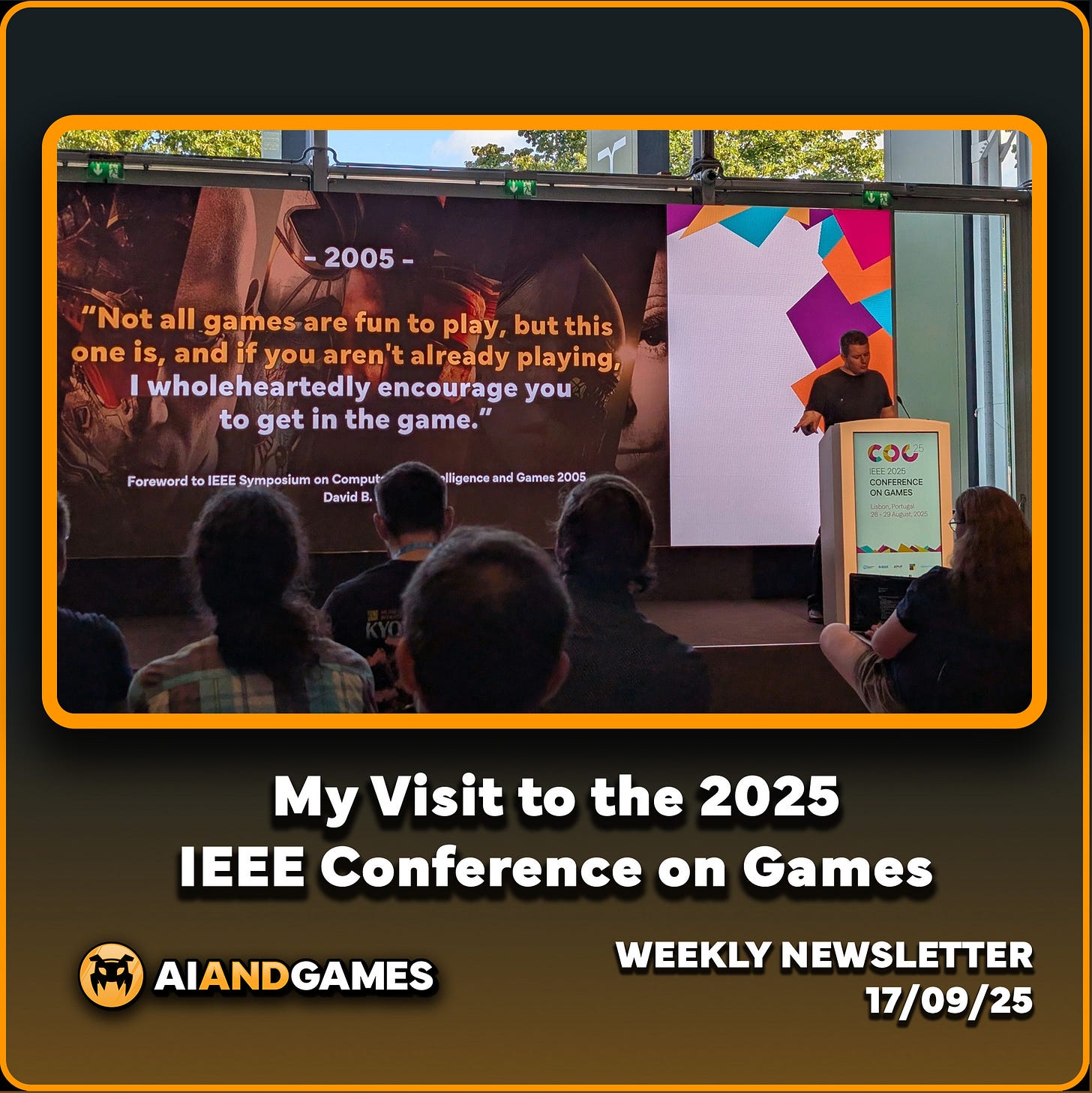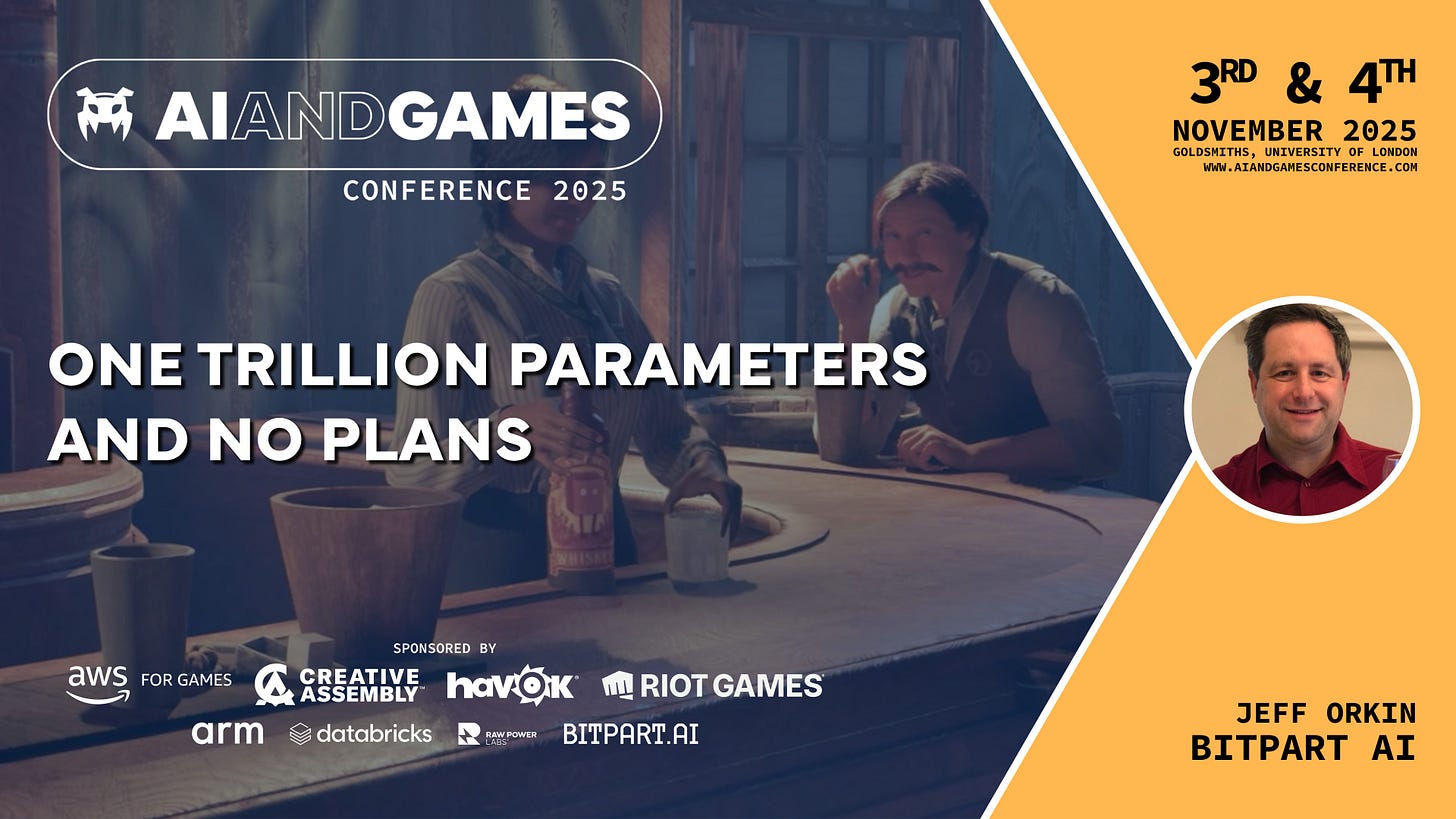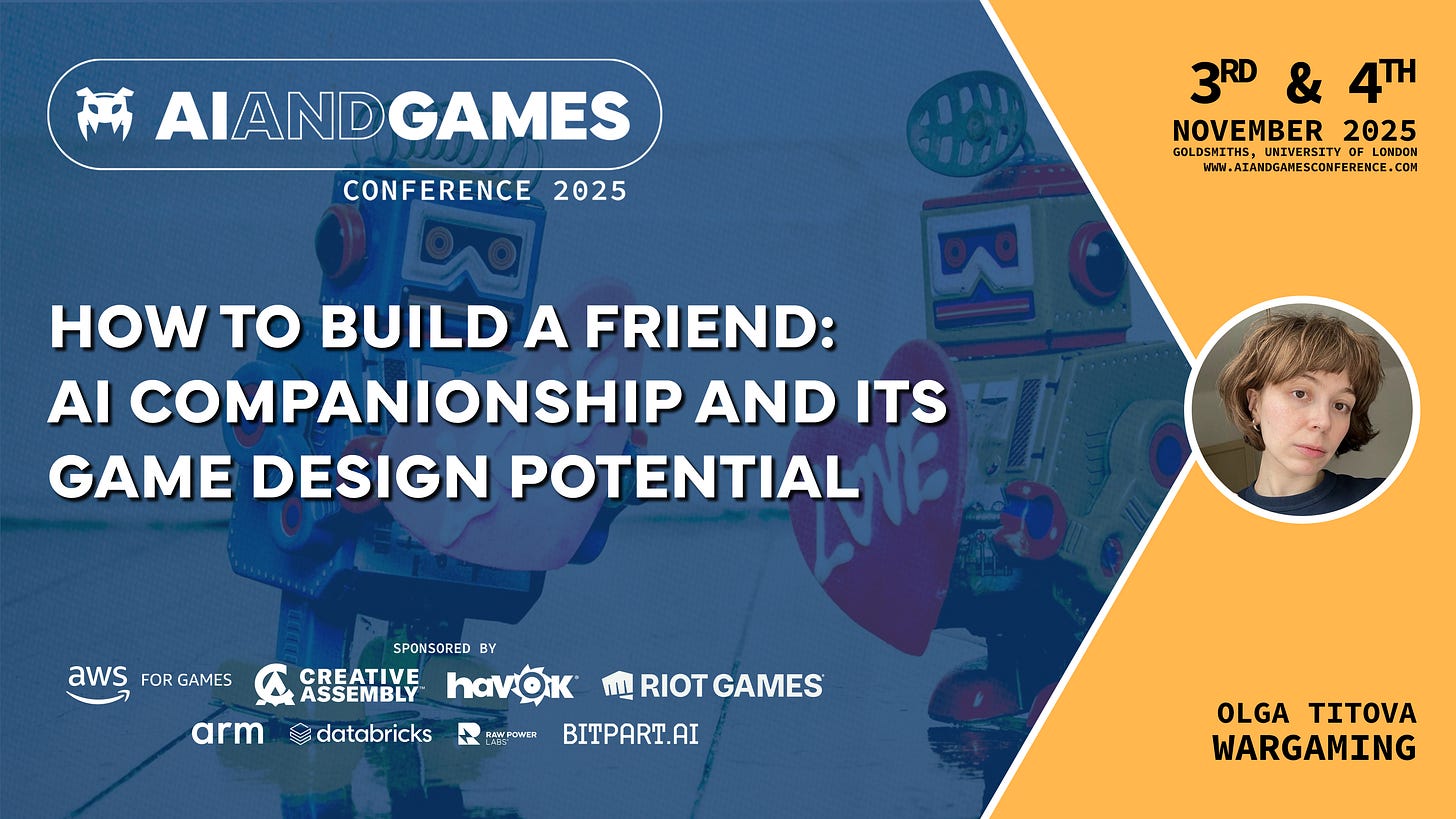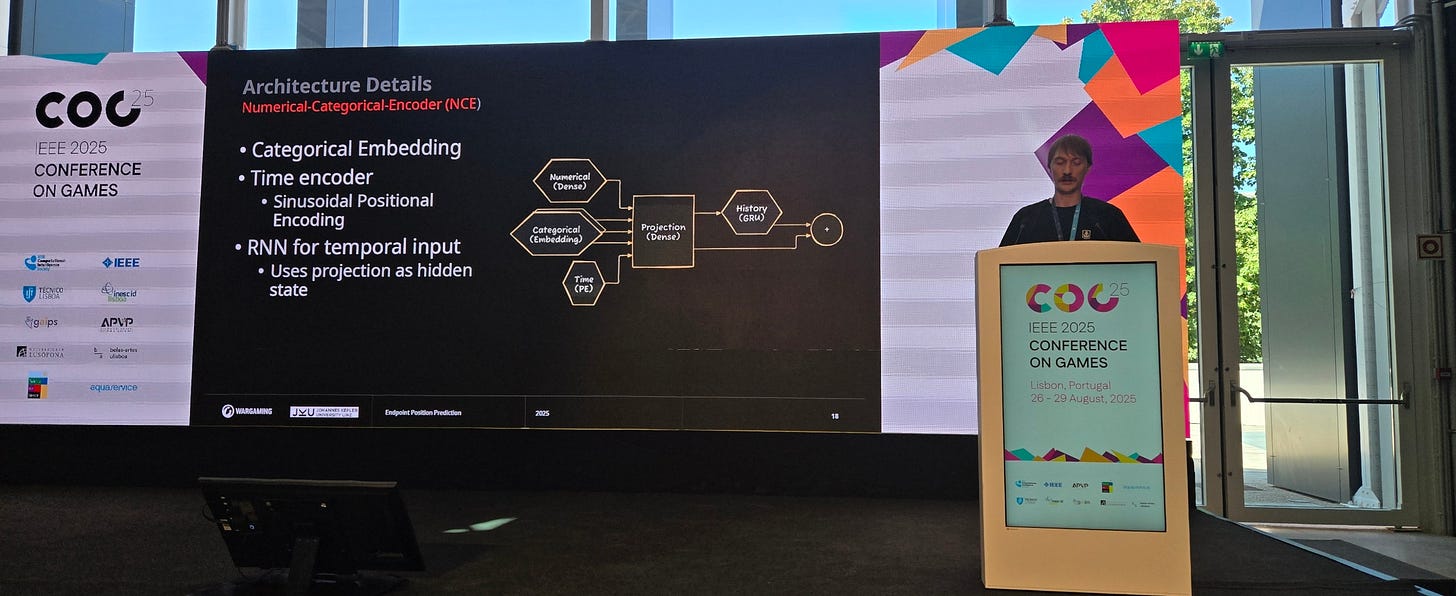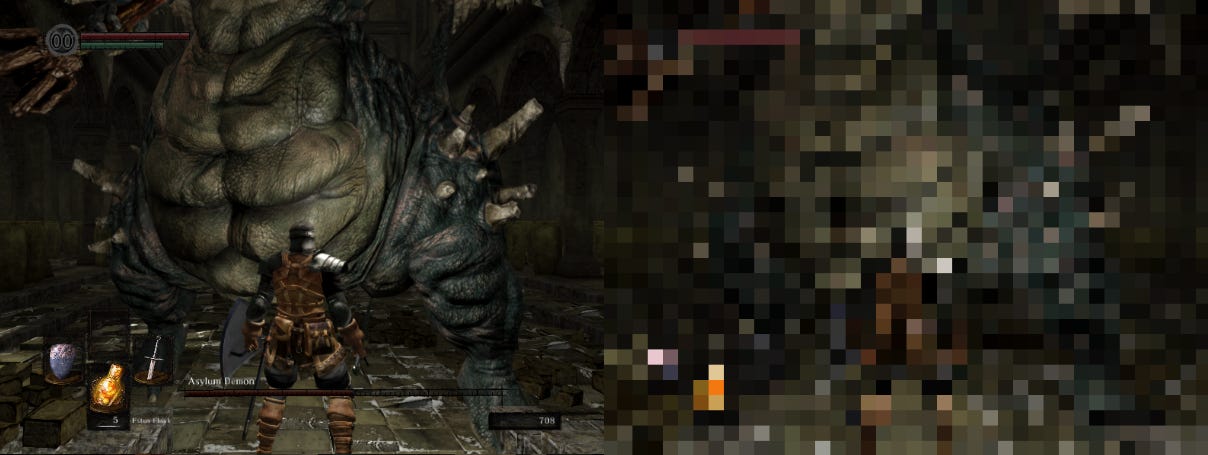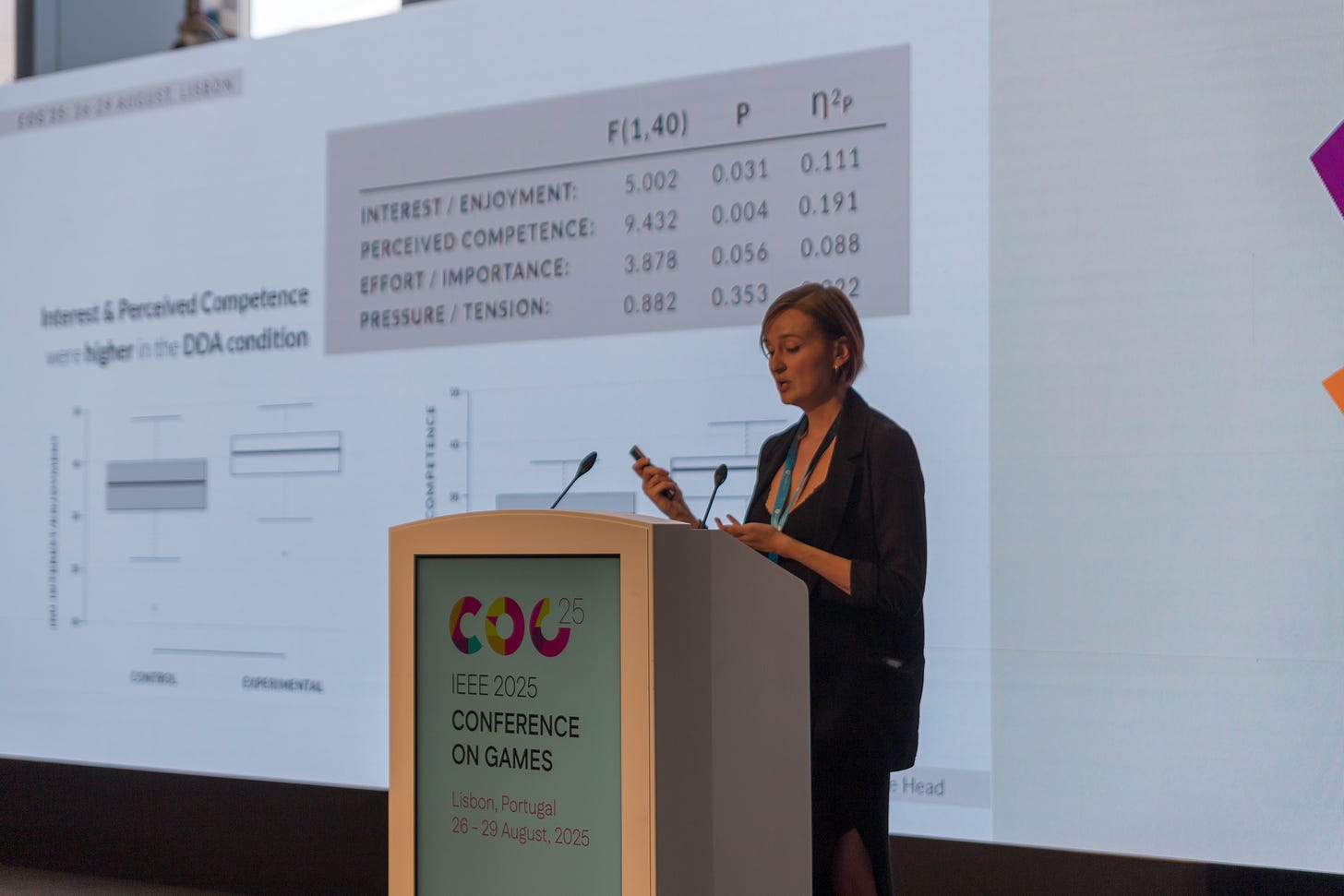Takeaways from the Largest Academic Conference on Games | 17/09/25
My trip to IEEE Conference on Games 2025
The AI and Games Newsletter brings concise and informative discussion on artificial intelligence for video games each and every week. Plus summarising all of our content released across various channels, like our YouTube videos and in-person events like the AI and Games Conference.
You can subscribe to and support AI and Games, with weekly editions appearing in your inbox. If you'd like to work with us on your own games projects, please check out our consulting services. To sponsor, please visit the dedicated sponsorship page.
Greetings one and all, and welcome to the AI and Games newsletter. This week I’m summarising my recent trip to the largest academic conference on games, the IEEE Conference on Games. But there’s plenty more on top of that. So what can you expect in this issue?
Talks from BitPart.ai, Wargaming, and CD Projekt Red announced for the AI and Games Conference 2025
Lara Croft’s voice actor is taking legal action against the publisher of the recent remasters of the franchise.
Training AI to predict future behaviour in War of Tanks!
Why a 35% success rate for an AI bot playing Dark Souls is a pretty stellar result!
Follow AI and Games on: BlueSky | YouTube | LinkedIn | TikTok
AI and Games Conference 2025
We have a whole bunch of announcements for the AI and Games Conference, so let’s start there!
Early Bird is Closed, Regular Tickets are Live
Our early bird tickets closed at the end of business on Friday last week, and we were very close to selling out the whole lot. Our entire run of ‘Indie’ and ‘Industry’ tier tickets sold out before the end of early bird, with but a handful of ‘Professional’ and ‘Student’ tickets remaining. These will be rolled over into our main ticket allocation.
With regular tickets now live, we’re still offering discounts for bulk purchases of five or more (email us at ‘contact’ at ‘aiandgamesconference.com). Meanwhile indies and students continue to have subsidised ticket prices courtesy of our sponsor Arm. We cap the student tickets at £99 regardless of whether you’re a freshman or a final-year PhD candidate. We are working to ensure the events continues to accessible to new and emerging talent
Talk Announcements Continue!
Last week we kicked things off by announcing the AI post-mortem of 1997’s Dungeon Keeper from Ian Shaw. This is but the tip of the iceberg of what’s to come, and we’ve been announcing new talks daily this past week. So here’s a quick recap of (some) of what you might have missed…
CD PROJEKT RED is coming to the AI and Games Conference
Having been on the GDC Game AI Summit advisory board the past few years, I know how important it is to get an interesting talk about a big game that people love. And I think we’ve sorted that problem right here.
I met Maciej Celmer when he delivered his talk on the MaxTac NPC systems for Cyberpunk 2077 at GDC 2025, and we had a great conversation - lovely gentleman. I then suggested he come and present his talk to us in London, and he kindly obliged!
One Trillion Parameters and No Plans
One of the most exciting announcements for me personally, is to say that Jeff Orkin - co-founder and CEO of BitPart.ai - will be presenting at this years conference. As many of you will know, Jeff was the AI programmer on FEAR back in 2005.
We recently interviewed him for our FEAR retrospective in 2024, and now he’ll be presenting on the work his company is developing at the moment. A mixture of traditional game AI and contemporary generative models. I suspect this will be a packed audience!
How to Build a Friend: AI Companionship and Its Game Design Potential
We welcome Olga Titova from Wargaming who will be presenting a talk on designing AI companions in an age of generative AI, but from the perspective of ethical considerations and user experience (UX).
This will sit quite nicely with some of the other presentations we have lined up to announce in the coming weeks!
AI (and Games) in the News
Only one headline that caught my eye this past week…
French Lara Croft Accuses Publisher of Cloning Their Voice with AI
A story that popped up on GamesIndustry.biz from Vic Hood. A recent patch to the Tomb Raider 4-6 Remastered game added restored lines of dialogue that were previously missing. However, when fans pointed out some issues with the lines by Francoise Cadol - the French voice actor of Lara Coft - that the lines sounded a little weird, she has since came to the conclusion they trained an AI on her voice to generte them, rather than ask the actor to come in and re-record them. She has now called out the games publisher in French newspaper Le Parisien and is taking legal action against the publisher Aspyr. No response from the publisher has been noted at this time!
Attending the IEEE Conference on Games 2025
At the end of last month I had the pleasure of being invited out to be one of the keynote speakers for the annual Institute of Electrical and Electronic Engineers Conference on Games (IEEE CoG), one of the longest running academic conferences in games research. Here’s a quick video giving you a taste of what it was like at the event, and bonus points if you spot me (I appear twice)!
Hosted at the Técnico Innovation Center in Lisbon, the conference was in fact celebrating its 20th anniversary, having originally started out as the IEEE Symposium on Computational Intelligence and Games - i.e. an AI-focussed research event. It rebranded in 2019 to the Conference on Games, while also expanding its remit into other areas such as game analytics, game design, user research, serous games (i.e. games for education/health/sustainability), accessibility and inclusivity in games, and much more.
To that end I was asked to present a keynote celebrating this 20th anniversary, which I decided to spend focussing on how AI research in games has evolved from its humble origins at the inaugural event hosted at the University of Essex in 2005. The idea of training AI using video games as a benchmark was still in its relative infancy - an idea that had been discarded by scholars for being frivolous despite traditional board games being a focus of research since the beginning of the field. I suspect more often than not the professors were so out of touch to realise video games had tremendous potential to impact research. But even then it took several years for this community to cement itself as an idea worthy of broader interest. Plus as discussed in my presentation, it took the best part of five years for ideas such as researching player behaviour and more AI-driven content generation pipelines to become commonplace.
For me this was also a chance to revisit my own history, given I was still a senior undergraduate student when the original symposium started. CIG/CoG proved a formative step in my career having published work at the conference during my PhD between 2007 through 2009 and again in my early years as a university lecturer in 2013 and 2014. So it was a real honour to be able to return to my academic roots as an invited speaker to present to this audience - didn’t hurt that Lisbon is also a beautiful city and the weather was just marvellous throughout!
Those pesky academics have a habit of organising these conferences in the nicest of places…
Some Presentation Highlights
While I sadly could not attend the whole week of the conference, I had managed to catch a bunch of presentations on Thursday and Friday. There were four tracks of material presented this year:
AI and Game Playing
Designing Games, Serious Games, and Playful Experience
Game HCI, Player Experience, Game Analytics, E-Sports
Game Technology
I’ll readily concede I focussed most of my time on the ‘AI and Game Playing’ track, given that is very much my jam. You can catch the full breakdown of accepted papers on their website, with the full proceedings on the IEEE Xplore site.
Note that the IEEE like many academic publishers will paywall all of these papers behind their website, and charge you for the privilege of accessing them. Academic publishing is a bit of a racket, given they charge authors to publish papers, and then charge everyone the courtesy of being able to read them. All the while the authors receive no residuals. If you’re really keen to read these papers, do not waste your money by paying IEEE for access. Instead search the likes of Arxiv, Google Scholar, or find the authors webpage at their institution, where you will typically find the papers hosted for free. Or in the worst case, just get in touch with the author(s)!
So let’s run through a handful of papers that caught my interest, complete with the links to check them out yourself!
RL- and LLM-based AI Solvers for the Game of Wordle/Fibble
Krerkkiat Chusap, Colin Murphy, Clay Hess, Sai Deepa Kadaru, Rohit Buccapatnam and Chang Liu
Like many households, we were very much caught in the thralls of Wordle during its big boom year of 2021. So there’s an interesting question of whether or not AI can learn to play games like Wordle, where you need to consider all of the possible outcomes.
This is actually something that reinforcement learning (machine learning) strikes me as well suited for. To that end the authors not only compared it against a Large Language Model (LLM) trained to play Wordle, but also Fibble: a variant of Wordle that deliberately lies about the information being given to the player in one cell per turn.
It was found that training a reinforcement learning agent performs better than a large language model at both Wordle and Fibble. With a fairly high success rate in Wordle, with a medium success rate on Fibble. It only had to sit and play the game for millions of runs mind you, but hey, that’s how these things work!
Can LLMs Generate Good Stories? Insights and Challenges from a Narrative Planning Perspective
Yi Wang and Max Kreminski
As a whole variety of startups and studios are exploring the idea of using LLMs to generate stories for games, the big question is whether they hold up to scrutiny.
Yi Wang gave an overview of research in validating and judging the quality of LLM-generated stories. Historically in games research (and even in game development), planning techniques have been used as means to generate narrative. While they lacked a lot of richer delivery in the prose and writing, they were largely guaranteed to create something that is consistent given planning AI has a very strict model of the world and how it changes. In this paper Wang used a planner as means to verify the consistency of LLM-generated stories, and found that in many established narrative design domains that planners stilled performed better in generating consistent stories.
It speaks to the issue that while LLMs can often generate rich and verbose language, they’re still not very good at holding up the logic of a a storyline - something that I personally think is impossible by virtue of their design. It’s also funny to see this research emerge having seen Meaning Machine’s GDC talk on how they have to ‘bully’ their LLM systems to keep on track - by essentially building gameplay systems around them to force said consistency.
A Multimodal Architecture for Endpoint Position Prediction in Team-based Multiplayer Games
Jonas Peche, Aliaksei Tsishurou, Alexander Zap, Guenter Wallner
A research project conducted in collaboration with the games studio Wargaming (World of Tanks/Warplanes/Warships etc.) to try and predict the future positions of players in a game anywhere from 15-90 seconds in the future. This would be useful for a variety of reasons in-game ranging from decision making (strategic, aiming, pre-emptive positioning), to tutorials and even behaviour analytics to catch anomalous play by cheaters.
To achieve this the team adopted a computer vision solution to attempt to predict Heatmaps of in-game positioning. This was achieved by sampling 2.2 million battles of World of Tanks across 29 maps and building a numerical categorical encoder that would anticipate movements over time (having sampled player movements from games at a roughly 15 second interval).
The resulting output was found to be pretty promising, and the studio is now considering experimenting with the approach to use it in game for bots.
Learning Dark Souls Combat Through Pixel Input With Neuroevolution
Jim O’Connor, Gary Parker and Mustafa Bugti
I’m a sucker for a paper about Dark Souls! This was a really interesting idea of learning to play Dark Souls using a Python framework using computer vision techniques. So unlike say the Wordle example earlier where the bot is fed data directly from the game state, here the AI has to learn by looking at the screen and processing pixel data like a real boy.
Trained using only raw color visual inputs on a 40x30 scale frame, they were capable of training an agent that has a win rate of around 35% against the Asylum Demon (the first boss of Dark Souls). It’s quite amusing when you realise that this is actually a pretty good success rate, the game is certainly not going to help make it easy for the research team!
And More…
I sadly can’t summarise everything I’ve seen because this newsletter needs to keep to some sort of limit, but some other interesting research I saw is provided below.
Generating Ensembles of Search Policies to Solve Baba Is You Levels,
Robert Ronge, Erik Albrecht, Dominik Woiwode, Alexander Dockhorn,Attempting to train AI to play ‘Baba Is You’, a game that is notorious for changing its own rules. Making it much more difficult to train an AI to play it.
A New Rules Balance Track for the Pokémon VGC AI Competition 2.0
Simão Reis, A. Lucas Martins, Rita Novais and Fernando AlvesThere’s a simulator for playing Pokémon battles as AI research (no seriously, it’s a thing). This paper digs into an expansion to the competition framework that creates a mode focussed on incentivising non-damaging moves by AI players, i.e. moves that will have delayed rewards.
How do Players Perceive Gender Discrimination? On the Differences of Harassment in Online Games
Ronja Fuchs, Jakob Droste and Alexander DockhornWinner of the best student paper award, is an analysis of a survey of players who have experienced harassment in games and the findings from these conversations that could lead to more valuable, inclusive, and supportive gameplay environments.
Sadly, I can’t find any freely accessible links to these papers (yet). Which for me trying to promote this great work makes it all the more difficult!
Wrapping Up
As I wrap up, I want to take a moment to thank the organisational team behind IEEE CoG for their support in bringing me over. Notably to general chairs Rui Prada and Mike Preuss, plus keynote chair Georgios Yannakakis. It was great to catch up with so many of my former academic colleagues, and also lovely to meet so many new faces in this community. I wish the CoG team all the best, and here’s to the next 20 years!
Plus as my final point, I want to give a shout out to my fellow keynote speaker Dr Alena Denisova from the University of York who gave a really engaging presentation on the Friday morning. This talk delved into her research in player experience modelling entitled “Not all struggles leave data: Evaluating perceived challenge in video games”.
It was a really interesting overview of her work in how evaluate player’s perceptions of challenge: be it from mechanical difficulty, emotional tensions or morally complex decisions. I had two things I really took away from this:
The template for the presentation had the title of the talk - ‘Not All Struggles Leave Data’ - appear throughout, and I found that really affecting in my own thoughts about this and other bodies of work.
Denisova’s framework for assessing player’s struggles is entitled the Challenge Originating from Recent Gameplay Interaction Scale, or y’know CORGI.
I am always excited when I find other researchers whose works are designed to create amazing acronyms.
Thanks for reading, and tune-in next week for the issue of our brand new series ‘The Take’, available to premium subscribers. I’ll see you then!



